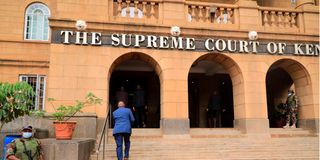
The Supreme Court building in Nairobi.
The Supreme Court has nullified several laws, including the Savings and Credit Cooperative Societies (Amendment) Act of 2018, which were enacted without the involvement of the Senate.
A full bench of the Supreme Court presided over by Chief Justice Martha Koome, ruled that amendments to the Sacco Societies Act and sections 3 and 4 of the Kenya Medical Supplies Agency (Kemsa) Act, introduced through the Health Laws (Amendment) Act of 2019, affected the functions and powers of county governments. Consequently, they should have been subjected to Senate scrutiny.
However, the judges suspended the declaration of unconstitutionality of the Sacco Societies (Amendment) Act, 2018 for 18 months from the date of the judgment.
This suspension allows Parliament adequate time to re-enact the legislation while following the constitutionally prescribed legislative process, ensuring Senate participation.
“We agree with the findings of the Court of Appeal that the purchase of drugs and medical supplies from Kemsa required the participation of the Senate,” the judges ruled.

Supreme Court judges (from left) Isaac Lenaola, Dr Smokin Wanjala, Philomena Mwilu, Chief Justice Martha Koome, Mohamed Ibrahim, Njoki Ndung'u and William Ouko.
Equalisation Fund Appropriation Act
The Supreme Court further upheld a 2021 Court of Appeal decision affirming that the Senate ought to have been involved in the enactment of the Equalisation Fund Appropriation Act of 2018.
Unlike the Sacco Societies Act, the court ruled that the nullification of provisions in the Kemsa Act and the Equalisation Fund Appropriation Act takes immediate effect, as there were no exceptional circumstances warranting a delay.
In another victory for the Senate, the Supreme Court affirmed that the Speaker of the National Assembly must notify the Speaker of the Senate regarding any Bill under consideration and whether it concerns counties.
The judges ruled that this notification is necessary to facilitate transparency, prevent procedural conflicts, and allow for proper concurrence in cases of disputes over a Bill’s classification.
“A purposive interpretation of Article 110(3) leads to the conclusion that determining whether a Bill concerns county government can only occur if both Speakers - who are central to the concurrence process - are informed about Bills introduced in either House,” the court stated.
Concurrence issue
The court further clarified that not all Bills require concurrence, and the process is only activated when there is uncertainty or disagreement over whether a Bill concerns counties.
“If both Speakers independently agree that a Bill concerns counties, they may proceed accordingly. However, if there is doubt or conflicting positions, the joint resolution mechanism must be invoked,” the judges explained.
On the contentious issue of Money Bills, the Supreme Court ruled that the Senate is excluded from their consideration and enactment, as prescribed by Article 114 of the Constitution.
“The exclusion of Article 114 from the scope of Article 96(2) clarifies that the Senate does not participate in the enactment of Money Bills. If a Bill falls within this category, the Senate lacks the power to introduce or consider it,” the judges ruled.
The court explained that this exclusion was deliberate and aligns with legislative practices in asymmetrical bicameral systems worldwide, where financial legislation follows distinct procedures to ensure smooth governance and public service delivery.







